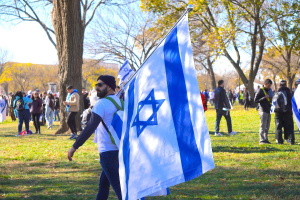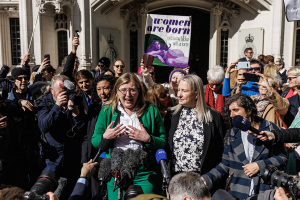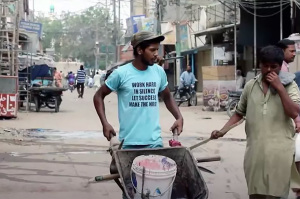Victims of Explosion in Israel Lament Plea Agreement
Ultra-right Jew who planted bomb ruled guilty but not responsible
JERUSALEM – A Messianic Jewish congregation leader whose son was almost killed by a bomb planted by an ultra-right wing Jew said he feels like the Israeli criminal justice system has abandoned him.
On Monday (May 28), the Jerusalem District Court approved a plea agreement for the man accused of bombing pastor David Ortiz's home, Jack Teitel, without consulting Ortiz or his attorneys, Ortiz said. The plea agreement is unique in that the court said Teitel committed the acts, but it did not hold him responsible for committing them.
Ortiz, leader of the Congregation of Ariel, said the prosecutor's office has also consistently misled his attorneys about basic information on important court filings for the case. Teitel has multiple charges against him for several acts of violence, including two killings, but prosecutors in Ortiz's case have sidelined or deliberately avoided him, Ortiz said. The Ortiz family opposes any plea bargain.
"They are doing it without any kind of consultation with us," Ortiz said. "The victims are either supposed to either OK it or reject it. They can't just make a plea bargain without consulting the victims. They are trying to ignore us."
The prosecutor that is supposed to be protecting Ortiz's interests is neglecting his duty, he added.
"He doesn't want to be seen protecting Christians," Ortiz said. "It doesn't benefit him in society."
Attack
On March 20, 2008, Teitel placed a Purim basket laden with explosives at the front door of the Ortiz apartment in Ariel, Israel, according to a confession Teitel made to police. The bomb was meant to kill Ortiz, who runs an active ministry in Israel and in parts of the Occupied Territories.
A part-time housekeeper brought the basket into the apartment and set it on a kitchen table. When the pastor's son, 15-year-old Ami Ortiz, opened the basket, it disappeared in an explosion that destroyed the Ortiz apartment and left Ami writhing in his blood on the kitchen floor.
In June the Jerusalem District Court is supposed to have another hearing to determine if Teitel is "criminally responsible" for the shootings and bombings. David Ortiz said he has long been concerned that the prosecution will make a deal with the defense in which they will say Teitel was insane when he set the bomb, thus making him not responsible for what he did.
For Ami, the question isn't about how much time Teitel spends in prison, but whether his heart is changed when he is released.
"I have forgiven him," Ami said. "I never felt the need for revenge. I have never felt any kind of hate for Jack Teitel. I hope God talks to him. I hope someone says to him something that will make him think about where he is heading in life. Is what he's doing right?"
Ami said he wants Teitel to accept Yeshua as Messiah. If one hour in jail led Teitel to a changed heart, "one hour would be great," he said.
After the Blast
Ami said that while he was on the floor after the explosion, he couldn't see or move. He could barely breathe and hear. Surprisingly, he still remembers the explosion.
"To me it sounded like a balloon popping, because it messed up my ears," he said.
Moments later, his apartment was full of people.
"I tried to get up, but they pushed me back down," he said. "I was bleeding. I couldn't see anything, and it was hard for me to breathe, so I was kind of panicky."
Someone asked him what was going on, and he said that the package had exploded.
"In the beginning I didn't feel pain – I just felt it was hard for me to breathe, very hard," he said. "I had to fight for my breath every time. I would talk; people would make me talk to make sure I was alive. I didn't feel any pain, my whole body was numb. "
About 20 minutes later, paramedics arrived at the scene and took Ami to a hospital. In the ambulance, the pain came over him suddenly and overwhelmingly, he said.
"I started panicking in there. I was afraid, very afraid, because I could hear my situation with the two paramedics talking between themselves. I really got it – and then the pain started."
His legs began to feel like they were burning, he said.
"It felt like my legs were broken. It's a strange pain. I can't describe it, but it's nothing I had ever felt before. I really couldn't take it. I asked them to put me down, and I woke up eight days later."
Recovery
For David Ortiz and his wife Leah, Ami's recovery was at once gut-wrenching and faith-affirming.
Ami's body was shattered. He spent eight hours in surgery with doctors doing two-hour rotations in the operating room. Ortiz said that at one time he felt like he had fallen into a "black hole." He remembers sitting down in the hospital thinking, "I'm gone, I can never get that back."
Leah Ortiz, spiraling in her own despair, told her husband, "I'm losing it."
David Ortiz said it was then, sitting in his son's hospital room, that he saw an image of Jesus on a throne and felt God speaking to him. He leaned in close to his wife and, as the message was revealed to him, he whispered it word by word into her ear, he said: "A decision has been made in made in heaven that you will not understand, but I have decided to glorify Myself. Ami is going to walk out of the hospital."
When Ami was carried into the hospital, doctors said his condition was, "matzav anush," or hopeless. But by 6 a.m., the lead doctor taking care of Ami approached the Ortiz family with a confession, of sorts.
"I have no medical terms to describe it," he said, according to Leah Ortiz. "I cannot speak to you in medical terms. Your son has experienced a miracle."
Legal Action
On Nov. 12, 2009, prosecutors indicted Teitel for the Ortiz bombing. They also indicted him on a host of other charges related to the shootings or attempted killings of several other victims.
Along with the Ortiz case, police said Teitel was responsible for the June 1997 shooting death of Samir Bablisi, a Palestinian taxi driver who was found in his cab with a single bullet wound to his head. Two months later, police said, Teitel shot Isa Jabarin, a Palestinian shepherd who was giving Teitel driving directions to Jerusalem.
Police also said that Teitel attempted to set fire to a monastery he believed was harboring missionaries and made several unsuccessful bombing attempts. He is accused in a September 2008 bombing that slightly wounded emeritus history professor Ze'ev Sternhell of Hebrew University in Jerusalem.
Teitel, 39, immigrated to Israel from the United States in 2000, is married and has four children. He lived in the West Bank settlement of Shvut Rachel, near Jerusalem. Police said that Teitel is an ultra-Orthodox Jewish nationalist who picked out his targets based on his nationalist philosophy.
Following his arrest, Teitel underwent at least two psychiatric evaluations. He was declared unfit for trial in the first evaluation in 2010. Tests afterward cleared him to stand trial.
Moving On
In many ways, Ami has moved beyond the attack. Scars and emotional damage will be with him the rest of his life, but Ami sees the bombing as a defining moment in his life that he refuses to let define who he is.
The bomb was meant to kill or at minimum maim David Ortiz and stop his ministry to the Jews in Israel. But instead it changed Ami, who admits that before the blast he wasn't that serious about his faith and hardly ever talked about it.
"I was just born into it. I never did anything special. I was just living my life," Ami said. "I never really thought about it."
After the bombing, that all changed, he said.
"You ask yourself, 'Where do you stand?' You have to start taking things seriously, because things are getting serious."
Now Ami, who attends a Bible college in the United States, talks openly about his faith, if for no other reason than that his history is emblazoned on his body in the form of scar tissue and residual metal fragments. He takes his role as a spokesman in stride.
"It's not something I try to avoid or will try to avoid, because it is not something I will be able to," he said. "I am living my life wherever God wants to take me. I know there's a reason for it, so I'm just going to play along. I'm not going to fight it."
Ami sees part of what happened to him as a warning for other Christians, be they gentiles or Jews who believe that Jesus is the Messiah. Persecution is coming, he said.
"It's the start," he said of the kind of persecution that he suffered. "We know from the Bible it's going to get much worse. Persecution of a higher level will come. If not five years, 10 years. If not 10 years, 15. It's not far."





























